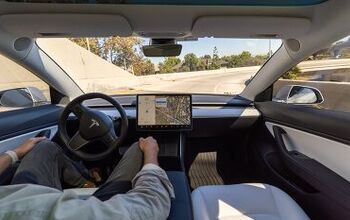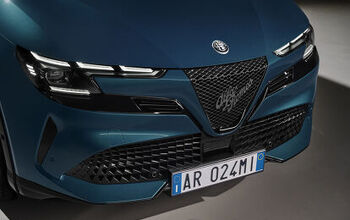Automakers Working Feverishly to Make Car Keys Disappear

Keys have evolved quite a bit over the last century. Most cars don’t require that you use a traditional key anymore, and proximity sensors take away the need to even lock and unlock a vehicle’s doors. While some of us appreciate the satisfying sensation of pressing a button or turning a key, it’s grown unnecessary. But some automakers want to take things a step further and abandon keys altogether.
We’ve heard BMW mention this before. Back in 2017, the brand’s head of sales said the automaker was actively reassessing the practical value of car keys now that keyless entry is the norm. “Honestly, how many people really need [keys],” Robertson said. “They never take it out of their pocket, so why do I need to carry it around?”
Now, the Car Connectivity Consortium (CCC), which includes BMW, General Motors, Hyundai, Volkswagen, Audi, Lincoln, Apple, LG, Samsung, Panasonic, and more, has published the Digital Key Release 1.0 specification. The aim is to establish a standardized solution for the industry that enables drivers to download a digital key onto their smart devices and use it on every vehicle they own.
Tesla already does something akin to this with its vehicles. Owners can use bluetooth devices to access their vehicle in the same manner as a proximity key. There’s also a backup key card that can be used when and if your smartphone runs out of battery. Other automakers provide the ability to unlock or locate the car using an appropriately paired wireless device.
The CCC says the new standard will make use of near-field communication (NFC) technology, with the system possessing “the highest state-of-the-art security level for vehicle access.” That includes remote entry to multiple vehicles and the ability to share access with others.
However, the technology, both old and new, has raised security concerns. Wireless devices and connected cars have already proven themselves to be vulnerable to hacking. While a physical lock takes some amount of time to pick, digital ones can be defeated in numerous ways. A key fob’s transmission can be blocked, leaving your vehicle open when you think you’ve locked it, whereas p roximity keys are vulnerable to amplifiers that effectively allow criminals to relay the signal to your car long after you’ve walked away from it. There’s also ways to capture transmittable data similar to how bandits skim credit card information remotely.
Fortunately, there’s a simple solution to this. All you need to do is place your key and cards in a cheap pouch or wallet with electromagnetic shielding. While they won’t work inside the pouch, it does offer total protection. But you can see how that might be an issue with a phone, as you’ll miss calls and texts until you remove it from the bag.
The Digital Key Release 1.0 announcement does talk quite a bit about security, without going into specific details. So we don’t know exactly how the CCC intends to implement its safety protocols. Since the system is supposed to work on “proven” NFC technology, we would expect it to be vulnerable to the same sort of exploits. Of course, we can’t say for certain until we’ve seen the product in action.
“I’m excited about the overwhelmingly positive response we’ve received from the industry to our standardized Digital Key solution, with new members signing up to help drive adoption and specification development,” said Mahfuzur Rahman, President of the CCC. “We’re already seeing products in the market that are leveraging Release 1.0, and I believe that the forthcoming Digital Key Release 2.0 will have an even bigger impact on the industry as we meet needs for massive scalability.”
Right now, the Release 1.0 specification is available to all CCC member companies. Release 2.0 is targeted for completion in the first quarter of 2019. Its intent will be to provide a standardized authentication protocol between the vehicle and smart device. The CCC also claims 2.0 will deliver a fully scalable solution to reduce development costs for adopters and ensure interoperability between different smart devices and vehicles.
[Image: BMW]

A staunch consumer advocate tracking industry trends and regulation. Before joining TTAC, Matt spent a decade working for marketing and research firms based in NYC. Clients included several of the world’s largest automakers, global tire brands, and aftermarket part suppliers. Dissatisfied with the corporate world and resentful of having to wear suits everyday, he pivoted to writing about cars. Since then, that man has become an ardent supporter of the right-to-repair movement, been interviewed on the auto industry by national radio broadcasts, driven more rental cars than anyone ever should, participated in amateur rallying events, and received the requisite minimum training as sanctioned by the SCCA. Handy with a wrench, Matt grew up surrounded by Detroit auto workers and managed to get a pizza delivery job before he was legally eligible. He later found himself driving box trucks through Manhattan, guaranteeing future sympathy for actual truckers. He continues to conduct research pertaining to the automotive sector as an independent contractor and has since moved back to his native Michigan, closer to where the cars are born. A contrarian, Matt claims to prefer understeer — stating that front and all-wheel drive vehicles cater best to his driving style.
More by Matt Posky
Latest Car Reviews
Read moreLatest Product Reviews
Read moreRecent Comments
- Tassos Tim is not that good with colors.The bright "pink" is not pink, but FUCHSIA. Both colors may look good on a woman's sweater, but not on steel panels.
- Tassos While I was a very satisfied owner of a much earlier Accord COupe 5 speed (a 1990 I owned from 1994 to 2016), I don't like the exterior styling of this one so much, in fact the 2017 sedan looks better. Or maybe it sucks in white. The interior of my 1990 was very high quality, this one looks so-so. The 157 k miles were probably easy highway miles. Still, Hondas are not Toyotas, and I remember the same service (like timing belt replacement) back then cost TWICE for an Accord than for a Camry. Add to this that it has the accursed CVT, and it's a no. Not that I am in the market for a cheap econobox anyway.
- 3-On-The-Tree My 2009 C6 corvette in black looks great when it’s all washed and waxed but after driving down my 1.3 mile long dirt road it’s a dust magnet. I like white because dust doesn’t how up easily. Both my current 2021 Tundra and previous 2014 Ford F-150 3.5L Ecobomb are white
- Bd2 Would be sweet on a Telluride.
- Luke42 When will they release a Gladiator 4xe?I don’t care what color it is, but I do care about being able to plug it in.


































Comments
Join the conversation
I think this is a bad idea and I am a pro-technology person. First, I frequently leave my devices at home (my normal carry devices rotate between an iPhone 8+, an Apple Watch and an iPhone 5s and occasionally a google nexus, depending on what I am doing). I also frequently leave the devices in the car. I do this solely to disconnect from the world in which I live and work. Second, I have no problem with car keys for the ignition, prox keys work fine for me mostly too - although I prefer the older style systems where you still turn a knob to acc/on/start - just without a key. One of my recent BMWs had a decent (instant) push-button start w/ prox key. I still would have preferred something else. My new Mercedes has a push-button start that is so slow to respond that when I first got the car, I would push it (starting the power-up cycle), nothing would appear to happen so I would push it again, (stopping the power-up cycle?), and push it again. It took me a while to realize that I had to push/release the button and then wait a few seconds for lights, cranking, etc. Same thing putting it into gear, but that's a whole different conversation. Every iteration has gotten slower to respond. Much like pushing the button on my cell phone to open the garage door is nowhere near as fast as the physical button I keep clipped to my visor. For the doors and trunk, I prefer prox keys. Sticking a key in the door seems pretty archaic, although, knowing what I know, I don't foresee changing the exterior house locks away from a primarily key based system until some changes are implemented. Third, this will be another avenue for car theft. We are going from a somewhat secure method (keys) to less secure (some prox keys) to a proposed system which will surely be less secure - especially if it is supported on multiple mobile operating systems. I suspect that at some point I will make a conscious decision to not buy any car newer than X. My 2018 car makes me think I should move the target back a few years. Maybe 2014. 2008 would be perfect with cameras, blind spot monitoring and adaptive cruise. And possibly keys.
So those of us that refuse to buy smart phones are screwed? I will NEVER own one of those infernal devices EVER. Which means I will also never own a vehicle that requires me to use one. Remember one little thing... just because you CAN do something doesn't mean you SHOULD.